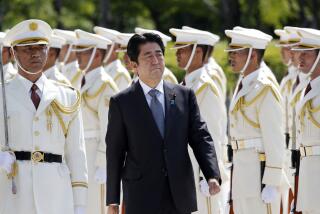Japan OKs National Flag, Imperial Ode
- Share via
TOKYO — The Rising Sun flag and an ode to the emperor were officially voted Japan’s symbols Monday after years of debate over whether the move would be a sign of resurgent nationalism.
The upper house of parliament voted in favor of the bill after overwhelming approval by the lower house last month.
Prime Minister Keizo Obuchi said in a statement: “Both ‘Kimigayo’ and the ‘Hinomaru’ flag have a long history and have already been widely accepted by the people, but I feel it is meaningful to have a legal basis for this as we head into the 21st century.”
The new law was denounced by Asian politicians and academics who see the flag and anthem as symbols of Japan’s militarist past.
The Rising Sun--a red disc on a white field--and the “Kimigayo” (“His Majesty’s Reign”) imperial hymn have long served as de facto national symbols. The flag flies outside schools and government buildings, and the anthem is played at sports events and public ceremonies.
However, they have not been legally sanctioned as national symbols since World War II because, to many Japanese and other Asians, the symbols represent Japanese aggression in the 1930s and ‘40s.
“Their flag will always remain a symbol of Japanese aggression, and it will remind the people of the sadness of the past and their unhealed wounds,” Hong Kong legislator Albert Ho said.
The move could add to rising tensions with Pyongyang over an expected North Korean missile test, said Chaiwat Khamchoo, dean of Chulalongkorn University’s social sciences department.
Japan’s government is trying to use that conflict to boost its military power, he said in Bangkok, Thailand.
“Japan has to bear that in mind and make its next move carefully to establish itself in a good position for dealing with Asian security issues,” Chaiwat said.
Another Asian scholar was less concerned.
“Japan still has quite a long way to go before it would count as a major military power,” said Gu Guanfu of the China Institute for Contemporary International Relations.
Obuchi’s government sought legal recognition for the flag and anthem after the suicide of a high school principal this year set off a national debate.
The principal was disturbed by his failure to resolve a dispute between the school board and teachers on whether to fly the flag and sing the anthem at the school’s graduation ceremony.
More to Read
Sign up for Essential California
The most important California stories and recommendations in your inbox every morning.
You may occasionally receive promotional content from the Los Angeles Times.










